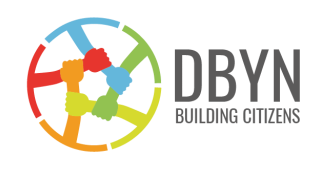|
The Building Bridges Toolkit is a web platform, designed to share the know-how on voluntary projects involving asylum seekers and refugees as well as raising awareness on forced migration in general. We want to inspire you with our case studies of successful projects on the topic. We also want to support you in starting similar initiatives by providing you with a list of practical guidelines on how to organize such projects and specific methods you can use inside them. The creation of this online toolkit has been driven by the ever bigger need of the international SCI network to exchange best practices on projects with refugees and asylum seekers. The project is coordinated by SCI Switzerland with the support of Utilapu Hungary. Its existence wouldn’t have been possible without the support of the Mercator Foundation Switzerland and the active contribution of Building Bridges working group and a number of SCI branches. The Building Bridges Toolkit is an ongoing project. We welcome you to send us your best practices in the field and inspire others to continue the work towards peace and intercultural understanding. Civil Service International founded by Pierre Cérésole, a Swiss engineer who established a peace and humanitarian movement in the aftermath of World War I and laid down the foundations of SCI in 1920. Cornerstone in their work are international work camps for volunteers. More info: http://www.sci.ngo.
0 Comments
Human rights cannot be defended by legal measures alone. They need to be protected and safeguarded by everyone, including young people. Human rights are best respected and appreciated when we know them, stand up for them and apply them in our lives.
COMPASS is a manual published by the Council of Europe's Youth Sector. COMPASS provides youth leaders, teachers and facilitators of human rights education activities, whether professional or volunteers, with concrete ideas and practical activities to engage, involved and motivate young people in leiving, learning and activing for human rights. It promotes a comprehensive perspective on human rights education and sees young people as actors for a culture of universal human rights. COMPASS was originally published in 2002 and is now available in more that 30 languages. A Version specifically designed for human rights education with children - COMPASITO - enjoys a similar success. This fully revised and updated edition includes new activities and information about human rights issues such as disability, migration, religion, remembrance, war and terrorism. COMPASS is a practical tool and resource for citizenship and human rights education. It is an essential companion for all those who are curious and interested in making the right to human rights education a reality for everyone. 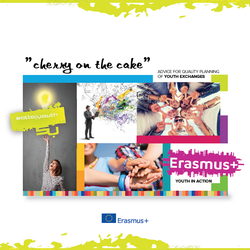 How can a Youth Exchange developed within the Erasmus+: Youth in Action programme be used as a complementary element of youth work? This publication explores all phases of Youth Exchanges -drafting, planning, preparation, implementation, conclusion and dissemination- and provides insight on what young people can learn in each phase, and how a youth worker or a youth leader can facilitate the learning process. Click on image to download 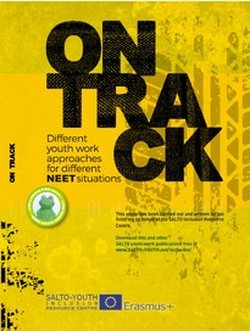 This research publication helps anyone working with youth to better understand the NEET issue and how you can effectively respond to the needs of young people in different NEET situations. Click on image to download NEET — Not in Employment Education or Training. The term is simple, but the complex range of problems, causes and individual circumstances this umbrella term refers to is anything but simple or uniform. While the term is used frequently by policy makers, and its use has become inescapable, using the term – given the ambiguity of what or whom it refers to – can often be unsatisfactory. This publication favours the term ‘in a NEET situation’, rather than use ‘NEET’ as a noun to describe a type of person. Likewise, there is no one action or strategy youth work can latch onto as ‘what to do about NEET situations’, anymore than there is one single type of NEET situation. The ‘On Track’ research publication is a tool for anyone working with youth to understand the essential concepts behind the NEET issueand how very different approaches are and should be taken towards young people in very different types of NEET situation. ‘On Track’ presents practical youth work interventions that address the very different causal factors of NEET. The examples show you how and why these practices work. An ideal source of inspiration. This booklet is part of the SALTO 'Inclusion for ALL' series. Check out the complete series at www.salto-youth.net/InclusionForALL/. 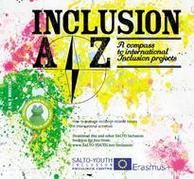 A compass to international Inclusion projects. The best of the SALTO Inclusion youth work manuals in one publication. Click on image to download Are you working with young people from fewer opportunity backgrounds? Would you like to add international mobility projects to your box of educational tools? Or are you working with “mainstream” youth? Are you interested in opening up your international projects to include (more) young people from fewer-opportunity target groups? Then this booklet might be just what you are looking for... “Inclusion A to Z” is designed to help open up Erasmus+: Youth in Action activities to as many potential users as possible. The booklet is intended to serve as a compass to help you steer through the issues of inclusion and the steps to managing an international-level activity from beginning to end. The combination of theory and practical methods presented here aim to equip you to either take your first steps into Erasmus+: Youth in Action with your inclusion group OR to improve the quality and scope of your current inclusion activities. Inclusion A to Z will help YOU to start creating new and exciting chances for young people to get involved and “go international”. With the launch of the Erasmus+ programme, the sections in our Inclusion booklets about Youth in Action became outdated. Instead of updating each single SALTO Inclusion booklet, we merged the best of each publication in one sturdy youth work manual for inclusion. Check out more SALTO Inclusion publications at www.salto-youth.net/InclusionForALL/. 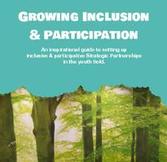 An inspirational guide to setting up inclusive & participative 'Strategic Partnerships' in the youth field. Click on image to download Are you working with young people with fewer opportunities (excluded or disadvantaged) and want to give them an opportunity to truly participate in society? Then this publication is for you! In this inspirational guide, we will take you on a practical journey towards change and social justice. We will show you how to set up true participative projects for and with young people who usually fall out of the boat. The course of a person’s life often depends on a few crucial experiences. And you can generate such trigger moments. Best of all is that the European Commission funds strategic longer-term initiatives. For years, inclusion and participation have been a priority within the Youth in Action Programme. This publication gives you the ins and outs of securing funding through Strategic Partnerships (Key Action 2) of the Erasmus+ Programme, with a focus on youth. Besides the funding information, we also give you tips and tricks to make your inclusion & participation projects as effective as possible. This publication coaches you through the different steps to make sure your project fits the needs of the young people you are working with and the community surrounding them. But where do you start? We help you to think outside the box by giving some examples of projects that we know of. Each of them shows how you can use the resources within the Strategic Partnerships (Key Action 2) to improve inclusion and participation. But it is, of course, up to you to adapt them to your goals. And don’t forget that Erasmus+ is only one funding format amongst many others. ‘Strategic Partnerships’ are there to support your projects and not to limit them. The core of the ideas in this guide stem from the Greenhouse Seminar developed in cooperation of the Belgian, German and Hungarian National Agencies and the SALTO-YOUTH Resource Centres Inclusion and Participation. It took place in May 2014 in Berlin. Check out more SALTO Inclusion publications at www.salto-youth.net/InclusionForALL/. 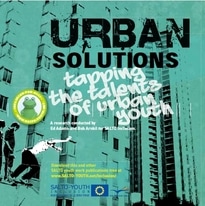 Discover the key findings from a research on social challenges faced by young people in (sub)urban areas. This publication gives an overview of the issues at stake in cities and analysed a variety of urban interventions to extract criteria for success. Click on image to download Cities can be tough places for young people to grow up. Urban areas offer great opportunities, but they can also present big challenges - especially for those with fewer advantages. This publication shows how youth and community workers play an important role to support young people in the cities, so that they can reach their full potential and make a positive transition to adult life. This research publication shares some insight and tips for anybody working with young people in (sub)urban areas: This study examines some of the big issues young people face in our cities today: unemployment, schooling, lacking facilities, distrust,... Further, it identifies the key components of working effectively with urban youth and highlights a number of successful interventions across Europe. We hope this booklet inspires change, as any crisis can be seen as an opportunity to improve current practice. Go for it! This booklet is part of the SALTO 'Inclusion for ALL' series. Check out the complete series at www.salto-youth.net/InclusionForALL/. 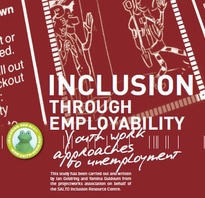 Discover the key findings from a research on youth employment and social exclusion. This publication presents success criteria for employment projects for young people with fewer opportunities. (2014 update) Click on image to download This publication helps practitioners to develop and carry out successful actions to support young people to find a job, especially those at a disadvantage compared to their peers. The report lists 4 key elements for effective and motivating employment projects: involvement and participation of young people; holistic coordination and governance; non-formal learning approaches; a few remarks about entrepreneurship. This publication contains: Some key concepts around youth and social exclusion. Trends in youth employment in recent years in the European Union. Outline of the impact of the economic crisis on youth employment; Overview of key EU youth policy development; Collection of recommended approaches that have been found to be effective when attempting to get excluded youth into the labour market. This booklet is part of the SALTO 'Inclusion for ALL' series. Check out the complete series at www.salto-youth.net/InclusionForALL/. 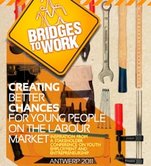 Get inspired for youth employment and entrepreneurship: key-notes, project examples and actions from the Bridges to Work stakeholder conference. (Antwerp, 2011) Click on image to download Bridges to Work was an engaging European conference aimed at creating better opportunities for young people on the labour market, especially for those who are at a disadvantage, compared to their peers. 150 stakeholders, including young job seekers, employers, youth projects, policy-makers, funding programmes and researchers, exchanged experiences and developed future actions to help lead young people into employment or entrepreneurship. This report shares the key-note contributions, the inspiring project examples and the proposals for concrete action to improve the employment situation of young people with fewer opportunities. We give you the bricks of inspiration, but you will have to build the bridges. This booklet is part of the SALTO 'Inclusion for ALL' series. Check out the complete series at www.salto-youth.net/InclusionForALL/. 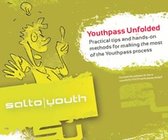 Practical tips and hands-on methods for making most of the Youthpass process. Start using Youthpass with your inclusion group! Click on image to download 'Youthpass Unfolded' is about three things: the Youthpass process in its different phases; different methods and tools for making the Youthpass process happen; reflections on Youthpass and recognition for inclusion groups. This handbook targets those who are involved in facilitating the learning process of young people in Youth in Action projects: mentors, youth workers/leaders, coaches, trainers... Youthpass was created in 2007 as the recognition tool for the Youth in Action programme. Since its introduction, many youth workers and youth leaders have been developing different ways of supporting young people in their learning within the YiA programme. Youthpass has inspired many people to think about and discuss the topic of learning. 'Youthpass Unfolded' takes a closer look at all of these questions and attempts to answer some of them. Special attention is given to overcoming obstacles that some young people might face when it comes to learning. This way, the Youthpass process becomes accessible to all. |
- Home
- About
-
Training
- Upcoming activities >
-
Past activities
>
- Youth Guardians
- Rise: Design for emergent futures
- Mental Health in Youth Work
- Yout(h)echnology
- European School of Animators 2023
- The Future is Europe
- Voices of Youth 2022
- Educate to Elevate Youth
- SoS-Safeguarding
- Play It Covid-Safe!
- Coping over coffee
- Statement Coronavirus
- I Youth Advocate
- Camino
- European Summer School of Animators 2019
- The Journey Never Ends
- European Summer School of Animators
- Ready, Steady, Go !
- Advocates for Education
- Common ground
- Rise Up !
- DB4R >
- En Route >
- All Alien
- You(th) for Human Rights
- Generations of Participation - Past training
- Advocacy
- Resources
|
The international secretariat of Don Bosco Youth-Net ivzw is financially supported by the European Union, through its 'Erasmus+'-programme, and by the Council of Europe, through its 'European Youth Foundation'. This website is a publication of Don Bosco Youth-Net ivzw. The website reflects the views only of the author, and neither the European Commission nor the Council of Europe can be held responsible for any use which may be made of the information contained therein.
|
